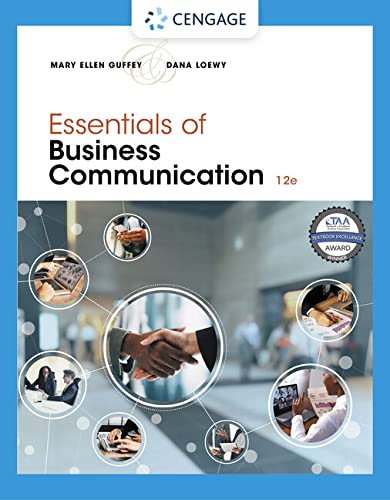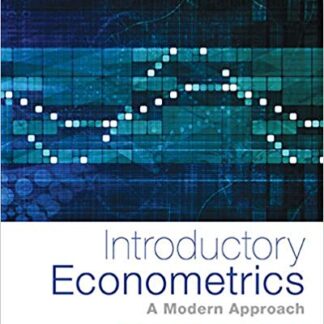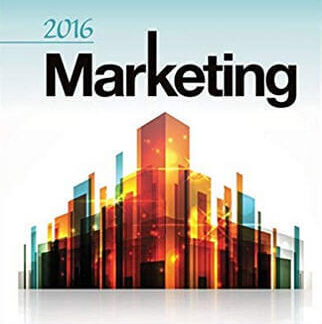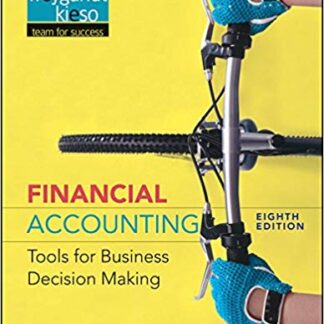Description
Essentials of Business Communication 12th Edition by Mary Ellen Guffey, ISBN-13: 978-0357714973
[PDF eBook eTextbook]
- Publisher: Cengage Learning; 12th ed. edition (April 1 2022)
- Language: English
- 600 pages
- ISBN-10: 0357714970
- ISBN-13: 978-0357714973
Ensure you have the job-ready writing and communication skills that today’s employers demand with Guffey/Loewy’s ESSENTIALS OF BUSINESS COMMUNICATION, 12E. This market-leading text and its online study tools help you develop the professional and communication skills that employers seek, including writing, speaking, critical thinking and teamwork. Updated employment chapters offer insights into a labor market that is more competitive and dependent on technology than ever before. The latest trends, technologies and practices, based on interviews with practitioners and the research of thousands of articles and blogs emphasize transferable professional skills. Timely advice guides you through building your brand, searching for a job, writing a winning resume, interviewing effectively and using LinkedIn. Optional editing challenges and grammar reviews and a complete grammar guide at the end of the book help you improve critical language skills.
Table of Contents:
- Brief Contents
- Contents
- Essentials of Business Communication 12e
- Appreciation for Support
- About the Authors
- Unit 1: Business Communication in the Information Age
- Chapter 1: Thriving in a Digital, Social, and Mobile Workplace
- 1-1 Succeeding with Twenty-First-Century Skills
- 1-2 Practicing Active Listening
- 1-3 Communicating Nonverbally
- 1-4 Understanding Culture and Communication
- 1-5 Ensuring Intercultural Effectiveness
- Summary of Learning Outcomes
- Key Terms
- Chapter Review
- Critical Thinking
- Activities and Cases
- Grammar/Mechanics Checkup 1
- Editing Challenge 1
- Communication Workshop: Technology
- Unit 2: The Writing Process in the Digital Era
- Chapter 2: Planning Business Messages
- 2-1 Exploring the Communication Process
- 2-2 Applying the 3-x-3 Writing Process to Business Messages
- 2-3 Analyzing the Purpose and Anticipating the Audience
- 2-4 Employing Expert Writing Techniques to Adapt to Your Audience
- 2-5 Improving the Tone and Clarity of a Message
- Summary of Learning Outcomes
- Key Terms
- Chapter Review
- Critical Thinking
- Writing Improvement Exercises
- Radical Rewrites
- Activities
- Grammar/Mechanics Checkup 2
- Editing Challenge 2
- Communication Workshop: Career Skills
- Chapter 3: Organizing and Drafting Business Messages
- 3-1 Drafting Workplace Messages Begins with Research
- 3-2 Organizing Ideas to Show Relationships
- 3-3 Writing a First Draft with Powerful Sentences
- 3-4 Mastering Four Helpful Writing Techniques
- 3-5 Building Well-Organized Paragraphs
- Summary of Learning Outcomes
- Key Terms
- Chapter Review
- Critical Thinking
- Writing Improvement Exercises
- Radical Rewrites
- Grammar/Mechanics Checkup 3
- Editing Challenge 3
- Communication Workshop: Social Media
- Chapter 4: Revising Business Messages
- 4-1 Revising: Applying Phase 3 of the Writing Process
- 4-2 Ensuring Message Clarity
- 4-3 Improving Readability with Strategic Document Design
- 4-4 Catching Errors with Careful Proofreading
- 4-5 Evaluating the Effectiveness of Your Message
- Summary of Learning Outcomes
- Key Terms
- Chapter Review
- Critical Thinking
- Writing Improvement Exercises
- Radical Rewrites
- Grammar/Mechanics Checkup 4
- Editing Challenge 4
- Communication Workshop: Technology
- Unit 3: Workplace Communication
- Chapter 5: Short Workplace Messages and Digital Media
- 5-1 Communicating in the Digital Age with E-Mails and Memos
- 5-2 Messaging and Texting at Work
- 5-3 Making Podcasts Work for Business
- 5-4 Telling Stories with Blogs and News Sites
- 5-5 Navigating Social Networking for Business
- Summary of Learning Outcomes
- Key Terms
- Chapter Review
- Critical Thinking
- Writing Improvement Exercises
- Radical Rewrites
- Activities and Cases
- Grammar/Mechanics Checkup 5
- Editing Challenge 5
- Communication Workshop: Social Media
- Chapter 6: Positive and Neutral Messages
- 6-1 Routine e-Mails, Memos, and Letters
- 6-2 Typical Request, Response, and Instruction Messages
- 6-3 Direct Claims and Complaints
- 6-4 Adjustment Messages
- 6-5 Goodwill Messages
- Summary of Learning Outcomes
- Key Terms
- Chapter Review
- Critical Thinking
- Writing Improvement Exercises
- Radical Rewrites
- Activities and Cases
- Grammar/Mechanics Checkup 6
- Editing Challenge 6
- Communication Workshop: Ethics
- Chapter 7: Bad-News Messages
- 7-1 Communicating Negative News Strategically
- 7-2 Examining Bad-News Strategies
- 7-3 Composing Effective Bad-News Messages
- 7-4 Refusing Typical Requests and Claims
- 7-5 Managing Bad News within Organizations
- Summary of Learning Outcomes
- Key Terms
- Chapter Review
- Critical Thinking
- Writing Improvement Exercises
- Radical Rewrites
- Activities and Cases
- Grammar/Mechanics Checkup 7
- Editing Challenge 7
- Communication Workshop: Intercultural Skills
- Chapter 8: Persuasive Messages
- 8-1 Understanding Persuasion in the Contemporary Workplace
- 8-2 Planning and Writing Persuasive Requests
- 8-3 Writing Effective Persuasive Claims and Complaints
- 8-4 Crafting Persuasive Messages in Digital Age Organizations
- 8-5 Creating Effective Sales Messages in Print and Online
- Summary of Learning Outcomes
- Key Terms
- Chapter Review
- Critical Thinking
- Writing Improvement Exercises
- Radical Rewrites
- Activities and Cases
- Grammar/Mechanics Checkup 8
- Editing Challenge 8
- Communication Workshop: Ethics
- Unit 4: Business Reports and Proposals – Best Practices
- Chapter 9: Informal Reports
- 9-1 Writing Reports in the Digital Age
- 9-2 Formats and Heading Levels
- 9-3 Analyzing the Problem, Defining the Purpose, and Collecting Data
- 9-4 Preparing Short Informational Reports
- 9-5 Preparing Short Analytical Reports
- Summary of Learning Outcomes
- Key Terms
- Chapter Review
- Critical Thinking
- Activities and Cases
- Grammar/Mechanics Checkup 9
- Editing Challenge 9
- Communication Workshop: Mastering Team Writing Projects
- Chapter 10: Proposals and Formal Reports
- 10-1 Crafting Winning Business Proposals
- 10-2 Preparing Formal Business Reports
- 10-3 Conducting Primary and Secondary Research
- 10-4 Documenting Information
- 10-5 Creating Meaningful Graphics
- 10-6 Assembling and Completing Formal Business Reports
- Summary of Learning Outcomes
- Key Terms
- Chapter Review
- Critical Thinking
- Activities and Cases
- Grammar/Mechanics Checkup 10
- Editing Challenge 10
- Communication Workshop: Technology
- Unit 5: Professionalism, Teamwork, Meetings, and Speaking Skills
- Chapter 11: Professionalism at Work: Business Etiquette, Teamwork, and Meetings
- 11-1 Developing Professionalism and Business Etiquette Skills On-Site and Online
- 11-2 Communicating Face-to-Face on the Job
- 11-3 Following Telephone and Voice Mail Best Practices
- 11-4 Excelling in Professional teams
- 11-5 Making the Most of Face-to-Face and Virtual Meetings
- Summary of Learning Outcomes
- Key Terms
- Chapter Review
- Critical Thinking
- Activities and Cases
- Grammar/Mechanics Checkup 11
- Editing Challenge 11
- Communication Workshop: Career Skills
- Chapter 12: Business Presentations
- 12-1 Creating Effective Business Presentations
- 12-2 Organizing Presentations to Connect With Audiences
- 12-3 Understanding Contemporary Visual aids
- 12-4 Preparing Engaging Multimedia Presentations
- 12-5 Refining Delivery, Rehearsing, and Performing Your Talk
- Summary of Learning Outcomes
- Key Terms
- Chapter Review
- Critical Thinking
- Activities and Cases
- Grammar/Mechanics Checkup 12
- Editing Challenge 12
- Communication Workshop: Collaboration Is King
- Unit 6: Employment Communication
- Chapter 13: The Job Search, Resumes, and Cover Messages
- 13-1 Harnessing Technology in Today’s Challenging Job Market
- 13-2 Exploring the Open Job Market
- 13-3 Unlocking the Hidden Job Market
- 13-4 Customizing Your Resume
- 13-5 Using Digital Tools to Fine-tune Your Job Search
- 13-6 Cover Letters – Do They Still Matter?
- Summary of Learning Outcomes
- Key Terms
- Chapter Review
- Critical Thinking
- Radical Rewrites
- Activities and Cases
- Grammar/Mechanics Checkup 13
- Editing Challenge 13
- Communication Workshop: Ethics
- Chapter 14: Interviewing and Following Up
- 14-1 Sharpening Your Interview Skills
- 14-2 Before the Interview
- 14-3 During the Interview
- 14-4 After the Interview
- 14-5 Preparing Additional Employment Documents
- Summary of Learning Outcomes
- Key Terms
- Chapter Review
- Critical Thinking
- Radical Rewrites
- Activities and Cases
- Grammar/Mechanics Checkup 14
- Editing Challenge 14
- Communication Workshop: Career Skills
- Appendix A: Document Format Guide
- Appendix B: Citation Formats
- Appendix C: Correction Symbols and Proofreading Marks
- Appendix D: Grammar/Mechanics Handbook
- Notes
- Index
A dedicated professional, Mary Ellen Guffey has taught business communication and business English topics for more than 40 years. She received a bachelor’s degree, summa cum laude, from Bowling Green State University; a master’s degree from the University of Illinois; and a doctorate in business and economic education from the University of California, Los Angeles (UCLA). She has taught at the University of Illinois, Santa Monica College and Los Angeles Pierce College. Now recognized as the world’s leading business communication textbook author, Dr. Guffey is the founding author of three award-winning textbooks: BUSINESS COMMUNICATION: PROCESS AND PRODUCT, ESSENTIALS OF BUSINESS COMMUNICATION, and BUSINESS ENGLISH. Each rigorously updated book continues to lead its market and, together, these books have helped hundreds of thousands of students around the world develop language skills. Dr. Guffey serves on the review boards of Business and Professional Communication Quarterly and the International Journal of Business Communication, publications of the Association for Business Communication. She participates in national meetings, sponsors business communication awards and is committed to promoting excellence in business communication pedagogy and the development of student writing as well as speaking skills.
Dana Loewy taught business communication at California State University, Fullerton for two decades. She enjoyed introducing undergraduates to business writing and honing the skills of graduate students in managerial communication. Concurrently, she taught various German courses and was a regular guest lecturer at Fachhochschule Nürtingen, Germany. In addition to completing numerous brand-name consulting assignments, she is a business etiquette consultant certified by The Protocol School of Washington. She also occasionally advises businesses and nonprofit organizations in the United States and several European Union countries on strategic communication. Dr. Loewy holds a master’s degree from Bonn University, Germany, and earned a her doctorate degree in English from the University of Southern California. Fluent in several languages, among them German and Czech, her two native languages, Dr. Loewy has published various poetry and prose translations, most notably THE EARLY POETRY OF JAROSLAV SEIFERT and ON THE WAVES OF TSF. Before co-authoring books with Dr. Guffey, Dr. Loewy worked as a professional translator for 25 years, during which she produced subtitles for thousands of major feature films and videos. Active in the Association for Business Communication, Dr. Loewy focuses on creating effective teaching and learning materials for undergraduate and graduate business communication students.
What makes us different?
• Instant Download
• Always Competitive Pricing
• 100% Privacy
• FREE Sample Available
• 24-7 LIVE Customer Support




